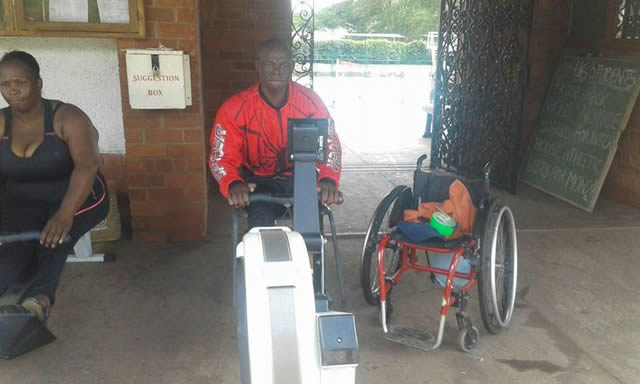Exercise, self perception

When we think of exercising, we tend to think of the physical benefits; improving our physiques body toning, improving skills and performances in order to win, improving our cardiovascular system and the prevention of diseases.We tend to think less about the psychological benefits including mood enhancement, stress reduction and social interaction. It therefore, takes some people by surprise when they find their attitudes being changed by exercise. But psychological benefits themselves can be a good reason for exercising as well because these effects assist us to go through life with ease.
As human beings at times we tend to be cruel and we delight in the misfortune of others without offering any solutions.
So it is no wonder at times we tend to feel inadequate and develop negative attitudes towards ourselves because of things like divorce, rejection, poverty, being overweight, being underweight and disability among a host of many other reasons.
The gym has been classified as a strongly physique evaluative environment, and for some this may cause anxiety instead of fun. Having high levels of concern about the appearance of our physiques will hinder our enjoyment of certain physical activities.
Some individuals tend to feel they are being assessed all the time and being found wanting because they do not fit the profile of the “body perfect”. It is all in their minds.
Anyone in their right frame of mind will not find fun in such situations because all that we have physically whether good or bad are endowments we got from the almighty and they can be altered or taken away at any time. No one had the opportunity to select or purchase a body or face.
In the gym you have people of different body shapes wearing all sorts of attire like leotards and tank tops. When one is in an environment where most people there are not only in good shape but exude confidence and energy some of those who are not in shape tend to develop negative attitudes towards themselves.
This is one reason some people do not join fitness centres or eventually cease to attend these places. This usually happens to highly competitive individuals who like to compare themselves against everyone in every aspect of life.
Sometimes the drive to win can take out the fun or the enjoyment we derive out of participating in physical activities. It takes a strong mind and confidence — in other words a good self perception, for one to ignore the surroundings and mind their own business.
Some individuals become bitter. I know a man who is obese. Health experts classify obesity as a level above being overweight. This man spent most of his time seated on machines and in the changing room where he would always be slandering well built persons and strong individuals in the gym as juicers (steroid abusers). Eventually he stopped exercising. He never asked for help but most people were willing to assist him because he is a star in his own field.
My heart bleeds when I see him around, if only he could have stopped judging himself through comparison to others.
The reason why most people do not offer help in exercise environments is because they fear causing offence. I recall trying to assist someone who was executing an exercise the wrong way. He fumed and said “Look here I know what I am doing and besides I do not want to look like you.” With attitudes like that people will just watch you lose motivation because your routines are not paying off.
The other reason that affects our self perception is that at times we take exercise as serious work. We think of working instead of playing. A cardiologist researcher once proposed that the word workout be replaced by “play-out”. The play approach makes for lifelong participation in exercise.
The motto “no pain, no gain “might work for competitive athletes but will not encourage people who lack physical activity disposition who benefit better from smart training. Smart training is ideal for the aged and those who lack an inclination to exercise.
Smart training is a way of exercising without straining or subjecting oneself to a lot of pain but at the same time deriving maximum benefits from a strategically formulated exercise regimen.
Exercise helps us to increase our self perception despite the predicament that we are in at a given time. Self perception in turn tends to shape our behaviour.
When some people expect you to worry about certain things like your physique you are not worried because you are doing something about it in your own way, at your own pace.
They get stressed about it and you do not. If one is genetically overweight; being able to carry your weight is the main issue and should be the immediate goal that can lead to other goals in future.
It is important to be content with one’s image. As one continues training the physique will change despite one’s goals being psychological. It may be necessary to have training partners or start exercising at home or engage the services of a trainer if one has a serious negative self perception. The training partners or personal trainer will act as a distraction to the negative perception.
They will reinforce and motivate you thereby diverting the perceived attention. Just do not compete against training partners. They should also understand your position and know your limits.
Our preferences vary when it comes to our choice of physical activities. If one is overweight or obese they cannot just start running. Weight training rather would be a good activity to start with.
Although it is not an aerobic activity it uses ATP energy (chemical energy within our body cells) and the muscles we build beneath the fat will energise us and enable us to upgrade our physical activities. It is actually a good starting point.
One can start by exercising the easy way, seated on machines or lying on benches. As one builds confidence they can then engage in the other activities.
My guest this week is fifty two year old Alexander Mkandla who came second in a wheel chair marathon race; a 42,2 kilometre race in George town in South Africa last week.
Disability is something that can happen to anyone at any time. Mkandla says he was afflicted by muscular dystrophy before he got involved in an accident in September 1987.
He was scheduled to go for a second operation but he was introduced to exercise and sport by a German physiotherapist.
He says he was sceptical at first but after counselling he started exercising as post rehabilitation activity. After some subsequent check-ups his doctor advised him that there was no longer any need for a second operation.
Mkandla is involved in many sporting activities but he is mainly involved in wheel chair racing and wheel chair tennis. Weight training assists him in strengthening his muscles for these sports although he has competed in several wheel chair body-building events.
He has won a number of trophies in all disciplines he participates in, making him a natural athlete. He says of late he has been invited to join a new sport that is being introduced at an elite school in Harare; that is rowing for people with disabilities.
His involvement in many sporting disciplines is being recognised by many people hence the invitation. He says his involvement in many sports is also a way of reassuring other people with disabilities: “We can do it, and there is nothing that can stop us”.
Mkandla says people with disabilities shy away from sport because of fear. He understands it because he also had this fear until the physiotherapist dispelled it. “It is a fear that one can aggravate the injuries further and the reluctance to sacrifice one’s time to these activities. I also get inspiration from other athletes with disabilities, for example the current World tennis champion has no hands at all and he has to have the racket strapped on but he is a very good tennis player. So I think if he can do it what about me, an individual with at least both hands?”
“Exercise has helped me do some of the things I could not do. I can stand up for a while although I eventually get a spasm in my legs.” Because, exercise saved him from a second operation Mkandla says he is not going to stop.
It has become a necessity and the fear is now in reverse as he would not want his health to degenerate because he has stopped exercising.
Mkandla says he is short of words to thank his wife Rachael Victoria Mkandla who is his pillar of strength and his two children Alex Praise and Angelica who is also into sports, playing cricket at school.
Mkandla bemoaned lack of necessary adjustments of facilities to suit the needs of people with disabilities at local gyms. He says there is need to adjust the changing rooms, showers and toilets. This is one aspect that discourages individuals with disabilities from joining health centres.
Worldwide research has indicated that generally there is a trend in the increase of sedentary lifestyle and physical inactivity is causing serious health problems and increasing costs for health agencies.
It is further explained that inactivity and its detrimental outcomes are even more common in individuals with disability hence the need for expansion of sports and exercise as rehabilitation.
Email: [email protected] Choga is a six time National Bodybuilding Champion with international experience. He is studying for a science degree in Physical Education and Sport.










Comments